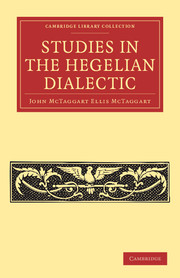
-
Select format
-
- Publisher:
- Cambridge University Press
- Publication date:
- 05 October 2012
- 22 December 2011
- ISBN:
- 9781139136587
- 9781108040334
- Dimensions:
- Weight & Pages:
- Dimensions:
- (216 x 140 mm)
- Weight & Pages:
- 0.36kg, 280 Pages
You may already have access via personal or institutional login
Book description
What is the nature of dialectic according to Hegel? And what is achieved by its means? These are the main questions that John McTaggart (1866–1925) seeks to answer in this work, first published in 1896. At the beginning of the twentieth century, the Cambridge-educated philosopher and fellow of Trinity College enjoyed a prominent position within the circle of idealist philosophers, and was regarded as one of England's leading Hegel scholars. Although a proponent of the German philosopher's dialectical thinking in general, McTaggart was not uncritical of Hegel's philosophy and objected to his application of abstract thought. In this work, McTaggart not only gives the reader a thorough introduction to Hegel's understanding of the dialectic method but also exposes a number of points on which he considers Hegel's teaching to be inaccurate: one of these is Hegel's insistence that evil is merely a delusion.
Contents
Metrics
Full text views
Full text views help Loading metrics...
Loading metrics...
* Views captured on Cambridge Core between #date#. This data will be updated every 24 hours.
Usage data cannot currently be displayed.
Accessibility standard: Unknown
Why this information is here
This section outlines the accessibility features of this content - including support for screen readers, full keyboard navigation and high-contrast display options. This may not be relevant for you.
Accessibility Information
Accessibility compliance for the PDF of this book is currently unknown and may be updated in the future.


